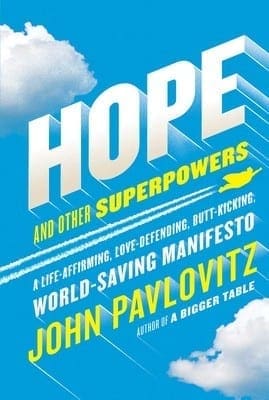When pulling John Pavlovitz’ new book from a FedEx envelope, my first thought was: “Hmm, this is the only book I’ve received with ‘butt-kicking’ in the title.” OK, it’s in the subtitle — but still.
However, anyone familiar with Pavlovitz’ widely read blogs and columns knows his voice has no semblance of a pacifying, safe-seeking pastor. He leans more toward stinging, prophetic utterances.
With widespread mischaracterizations of Jesus, and abuses of and by the church today, we need some plainspoken challenges from articulate, insightful, courageously loyal critics — and Pavlovitz is one of them.
There is a place for some irreverence in Christian dialogue, though not every place. And not everyone can or should play the role of confrontational critic — though Jesus sure could find that voice when the opportunity was right.
However, Pavlovitz has more to offer than critiques and complaints. He is not mired in despair — offering a hopeful course of constructive action.
In Hope and Other Superpowers: A Life-Affirming, Love-Defending, Butt-Kicking, World-Saving Manifesto (Simon & Schuster), Pavlovitz pulls readers (and perhaps himself) from the dismay many thoughtful Christians and others rightfully feel about this time in American life — when so many professing believers are more concerned with losing cultural dominance and privilege than walking in the Way of Christ.
That doesn’t mean Pavlovitz has grown soft. The first words one reads are an endorsement by Rosie O’Donnell. He remains a straight-shooting, story-telling, at-times confrontational advocate for actually living according to the attributes and calling revealed by Jesus.
Should the North Carolina-based minister and writer offend the more sensitive or defensive reader or listener, then he just may be fulfilling his calling. Rather than repeated ranting, however, what readers find in Hope and Other Superpowers is Pavlovitz helping to map a way out of this mess.
Indeed, many of us “dwell on the swirling, ever-present storm of bad news” that can lead to a sense of helplessness and hopelessness. In this writing, Pavlovitz drags us with him from the temptations of apathy and cynicism to claim our rightful roles as “fierce caretakers of hope.”
Our mistake, he writes, is that we have too often sought the hope we need in outside sources rather than looking within.
“It isn’t the sky that holds our hope for the planet, it’s the mirror,” he writes, “and the time has come for us to reconnect to the sacred, essential why of our lives and to live more fully from that place.”
The essential question, said Pavlovitz, is: “What kind of person does this world need right now?”
With continual references to imaginary superheroes — suggesting young John once nestled up with a lot of comic books — Pavlovitz helps readers identify ways of “cultivating key traits” which he also calls “ordinary superpowers.”
For those of us disappointed in and dismayed by the abject failure of a large portion of American Christianity to put the life and teachings of Jesus ahead of self-interest and self-preservation, this is needed good news. It is not naïve, but offers realistic and constructive guidance away from the kryptonite of distress and defeat to the horizon of hope.
He urges readers to focus on how their gifts match the needs before them — and to be willing to leverage whatever influence is personally available to bring about good. Even when facing obstacles and criticism.
“Whether in matters of activism or career or parenting, many well-meaning, deeply feeling people burn out because they allow the storms around them and inside of them to consume them,” he writes, obviously out of experience. “If you aren’t actively working to prevent it, the bad news and the harsh words and the mean people will get inside your system and create a toxic environment in which hope cannot survive.”
Pavlovitz offers practical ways to combat such negative influences — such as separating one’s identity from the criticism and taking time away from the fray.
Yet as surely as Clark Kent turns into Superman, we can come out of the phone booths (young person, ask your parents about those) of our lives to face the challenges ahead with hopeful giftedness. Instead of taking on the universe, however, each of us has a part of the world we can influence for good.
Anyone can prosper in the best of times. Pavlovitz reminds us that, “Adversity … is always an invitation to be transformed.”
Perhaps his best directive is to never, ever accept negative criticism for being an empathetic and caring person. Being called a “bleeding heart” is not the insult it is intended to be — for the Golden Rule still applies.
“Your compassion isn’t a shortcoming; it is the greatest of day-saving, despair-fighting superpowers,” writes Pavlovitz. “The world needs joyful, defiant damn-givers.”
To the power of compassion, Pavlovitz calls for adding courage, kindness, humor, truth-telling, persistence, wonder, gratitude and creativity.
“Creativity is one of the greatest weapons against despair and hopelessness because it is so versatile,” he writes. “…It can be an agent of change and a balm for those in pain.”
With inspiring and often personal stories of humanity, mingled among the superheroes, Pavlovitz helps readers mired in defeat to kick the mud off their boots and take action.
It is not until page 161 that Pavlovitz brings the specifics of Christian faith to his case. Not because he considers it unimportant, but to acknowledge that superheroes come in different hues and with various gifts.
While not a theological treatise, Pavlovitz clearly argues against faith as mere escapism from earthly duty.
“The pursuit of God, for me, hasn’t yielded a sense of separation from the world and people around me, but a deeper connection to them both, an awareness of the interdependence of everything; the oneness of it all.”
And nothing good gets done until we became action figures, notes Pavlovitz.
“Superhero work isn’t easy — in fact, it can be messy, stressful, and down-right painful,” he writes. “That’s because you can’t really be all that heroic without action.”
X-ray vision and leaping tall buildings in a single bound would be nice. But bringing compassion and hope to an often messed-up world is not a bad way to spend one’s time and gifts.
-Visit nurturingfaith.net for daily religion news, thoughtful blogs, excellent books, inspiring experiences and to subscribe to Nurturing Faith Journal.
Director of the Jesus Worldview Initiative at Belmont University in Nashville, Tennessee and former executive editor and publisher at Good Faith Media.



